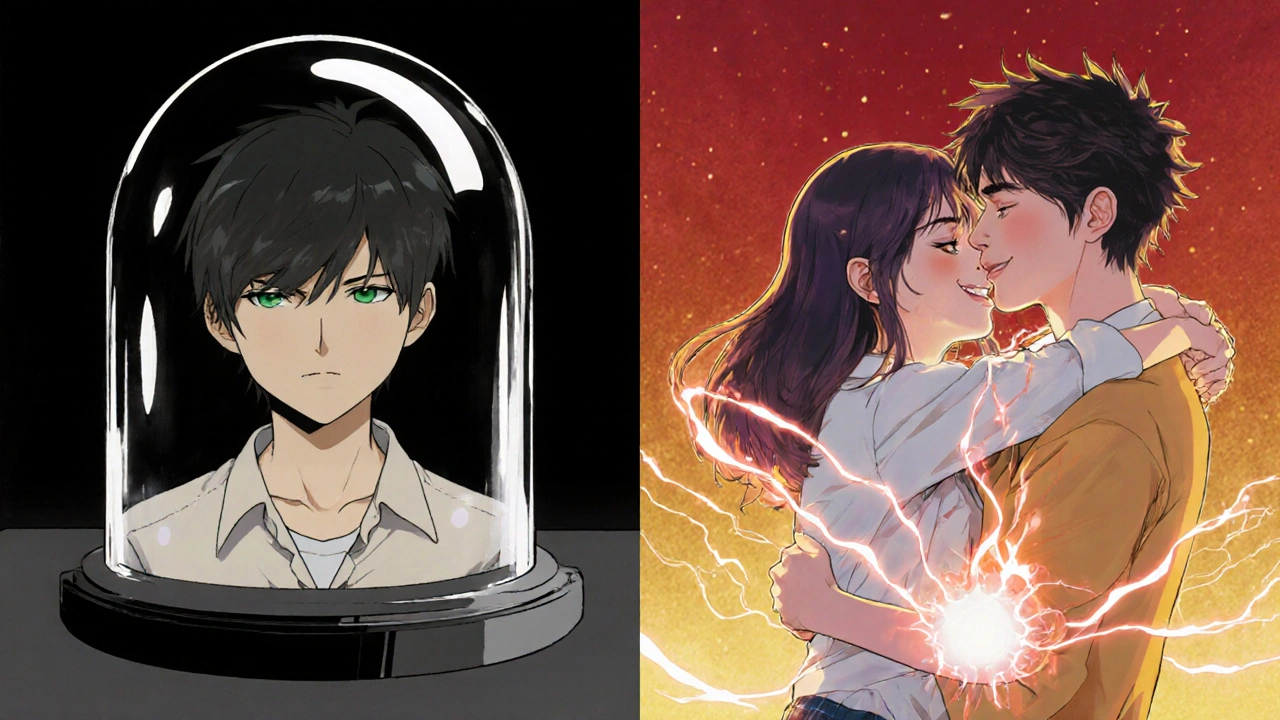Antidepressant Emotional Blunting Risk Checker
This tool helps you understand emotional blunting risk based on different antidepressant classes. Emotional blunting affects 40-60% of people taking SSRIs and can significantly impact your quality of life. Compare your options to find the best approach for your emotional well-being.
SSRIs
40-60% riskMost commonly prescribed antidepressants (sertraline, escitalopram, fluoxetine)
May cause emotional blunting by altering serotonin levels. The risk is highest with this class.
Show detailsSNRIs
40-55% riskVenlafaxine and similar drugs that affect serotonin and norepinephrine
Similar risk profile to SSRIs with emotional blunting effects.
Show detailsBupropion
~33% riskWellbutrin - targets dopamine and norepinephrine
Lowest emotional blunting risk among antidepressants. Often used to counteract blunting from SSRIs.
Show detailsMirtazapine
25-30% riskMay help with mild blunting but can cause weight gain
Often used when other options aren't tolerated.
Show detailsEmotional Blunting Risk Overview
Emotional blunting is a common side effect of antidepressants that affects your ability to feel emotions fully. The table below shows the estimated risk for different medication classes:
| Medication Class | Emotional Blunting Risk | Key Considerations |
|---|---|---|
| SSRIs | 40-60% | Most commonly prescribed; highest risk of emotional blunting |
| SNRIs | 40-55% | Similar risk to SSRIs |
| Bupropion | ~33% | Lowest risk; targets dopamine, not serotonin |
| Mirtazapine | 25-30% | May help if blunting is mild; causes weight gain |
| Vortioxetine | ~30% | Promising but mostly manufacturer-sponsored studies |
Important: Emotional blunting isn't just about negative emotions—it affects your ability to experience joy, excitement, and even love.
You started taking an SSRI because you were drowning in sadness. But now, you don’t cry at movies. You don’t laugh at your dog’s goofy antics. You feel… nothing. Not bad. Not good. Just flat. If this sounds familiar, you’re not alone. Around 40-60% of people on SSRIs like sertraline, escitalopram, or fluoxetine report this strange side effect: emotional blunting. It’s not just being tired. It’s losing the ability to feel joy, grief, anger-even love. And most doctors don’t ask about it.
What Emotional Blunting Actually Feels Like
Emotional blunting isn’t just being ‘a little numb.’ It’s a quiet erasure of your emotional landscape. People describe it as living behind glass. You see the world moving around you-birthdays, funerals, hugs, arguments-but you don’t feel it. One user on Reddit said, “I stopped crying at sad movies and didn’t feel joy when my dog greeted me-just a flat nothing.” That’s not improvement. That’s loss. It hits both sides: positive and negative emotions. You don’t feel the thrill of a good joke. You also don’t feel the sharp sting of betrayal. Your reactions slow down. You might smile because you know you’re supposed to, but the feeling underneath? Gone. This isn’t depression lingering. This is something different. Studies from the University of Cambridge show SSRIs interfere with reinforcement learning-your brain’s way of learning what feels good and what doesn’t. When that system slows, everything feels equally distant.Why It Happens (And Why Doctors Miss It)
SSRIs work by increasing serotonin in your brain. That helps some people stop spiraling into despair. But serotonin doesn’t just control sadness-it’s tied to how your brain processes emotion, reward, and motivation. Too much, too fast, and your emotional dial gets turned down. It’s like turning the volume on your feelings to 10%. The problem? Most doctors don’t screen for this. A 2022 survey of 1,247 psychiatrists found only 38% routinely ask patients if they’ve lost their emotional edge. They focus on sleep, appetite, suicidal thoughts. They miss the quiet, creeping numbness. Why? Because it’s not listed as a side effect on most drug pamphlets. And until recently, it was dismissed as “just better than being suicidal.” But that’s not good enough. When your wife says, “I don’t feel like you love me anymore,” or your creative work dries up because you can’t tap into feeling, you’re not just dealing with a side effect-you’re losing parts of yourself.Which SSRIs Cause the Most Blunting?
It’s not just one drug. Escitalopram, sertraline, fluoxetine, paroxetine-all can trigger it. Research shows no big difference between them. If you’re on one and feel numb, switching to another SSRI won’t help. The problem isn’t the brand. It’s the class. Here’s what the data says about other antidepressants:| Medication | Estimated Risk of Emotional Blunting | Notes |
|---|---|---|
| SSRIs (e.g., sertraline, escitalopram) | 40-60% | Most commonly prescribed; highest risk |
| SNRIs (e.g., venlafaxine) | 40-55% | Similar risk to SSRIs |
| Bupropion (Wellbutrin) | ~33% | Lowest risk; targets dopamine, not serotonin |
| Mirtazapine | 25-30% | May help if blunting is mild; causes weight gain |
| Vortioxetine | ~30% (limited data) | Promising but mostly manufacturer-sponsored studies |
Bupropion stands out. It doesn’t boost serotonin-it boosts dopamine and norepinephrine. That’s why people on it report more energy, motivation, and emotional responsiveness. If you’re struggling with emotional blunting, switching to bupropion is the most evidence-backed move.
What to Do If You’re Feeling Numb
Don’t stop cold turkey. Abruptly quitting SSRIs can cause dizziness, brain zaps, nausea, and even rebound anxiety. You need a plan. Step 1: Talk to your doctor-but don’t just say, “I feel numb.” Be specific: “I don’t cry anymore, even when I want to.” “I don’t feel excited about things I used to love.” “My partner says I seem distant.” Step 2: Try a dose reduction-if your depression is stable. Cutting your SSRI dose by 25-50% helps 68% of people regain some emotional range, according to a 2021 review in Frontiers in Psychiatry. You don’t need to quit. You might just need less. Step 3: Consider switching or adding bupropion-This is where real change happens. A 2022 meta-analysis of 1,243 patients found that switching entirely to bupropion improved emotional blunting in 72% of cases. Even better: adding low-dose bupropion (150mg/day) to your SSRI lets you lower the SSRI dose while keeping depression under control. Success rate? 63%. Step 4: Give it time-Emotional recovery doesn’t happen overnight. It takes 4-6 weeks after any change for your brain to adjust. Be patient. Track your feelings in a journal: “Today, I smiled at my neighbor. I felt… nothing.” Then, “Today, I laughed at a meme. I felt a flicker.” Small signs matter.When Emotional Blunting Might Not Be the Drug’s Fault
Some experts argue emotional blunting isn’t always caused by SSRIs-it might be leftover depression. Dr. John Krystal, editor of Biological Psychiatry, says: “Some studies challenge the view that emotional blunting is solely a medication side effect-it also behaves like a residual symptom of depression.” That’s why screening matters. If you’ve been on an SSRI for months and still feel flat, it could mean your depression isn’t fully treated. Or it could mean the drug is doing too good a job-smothering your emotions along with your pain. Only a careful evaluation can tell the difference.







Write a comment
Your email address will be restricted to us